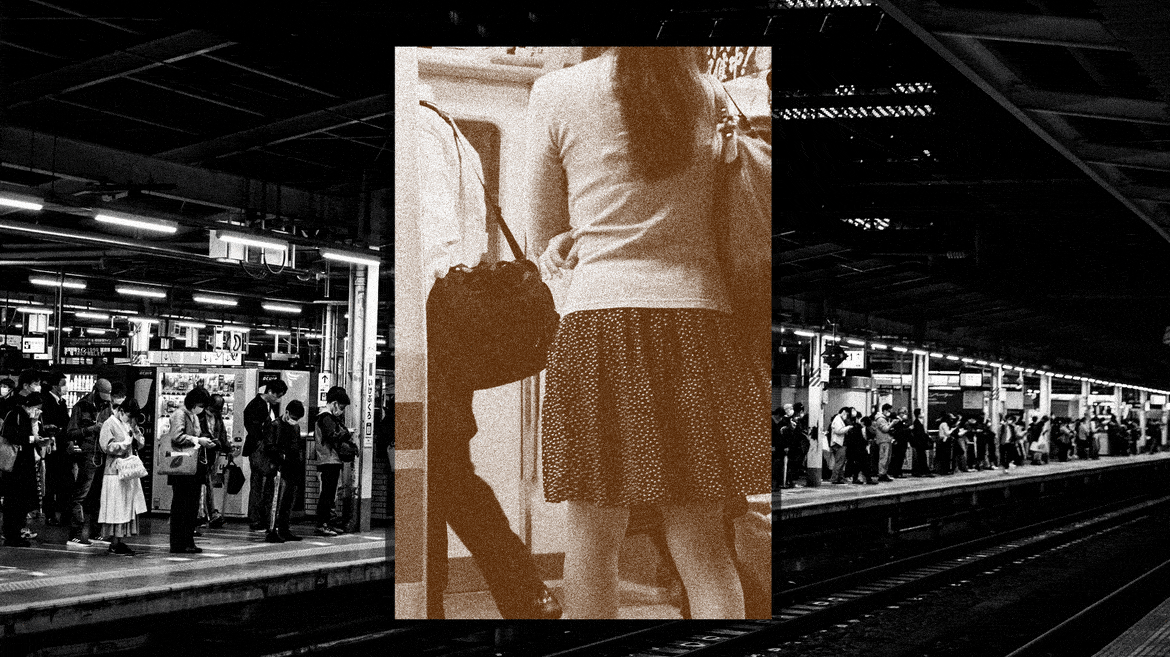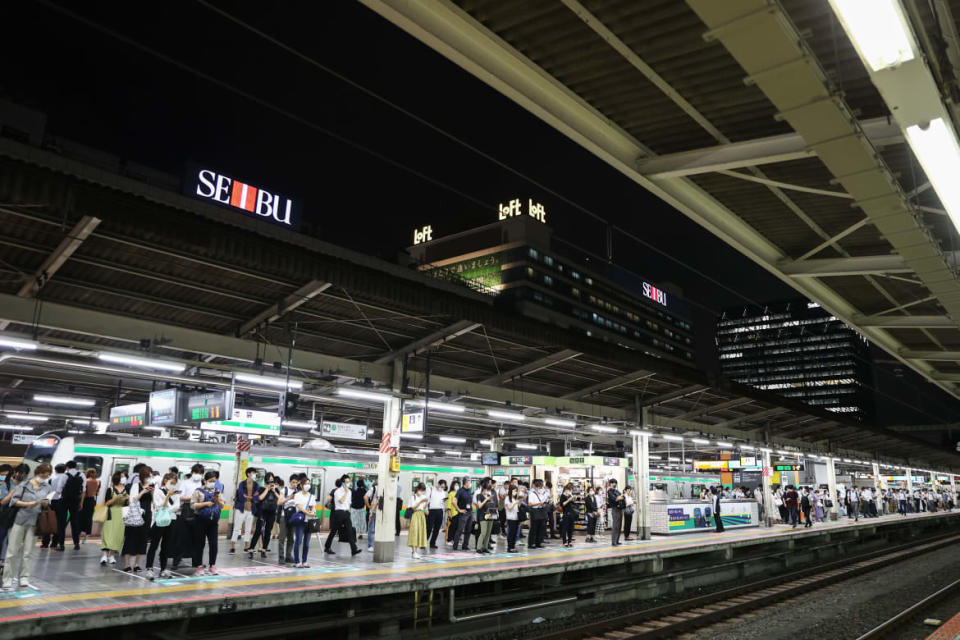Subway Creep’s Desperate Plea to Cops Sets Off Wild Vigilante Saga

- Oops!Something went wrong.Please try again later.
TOKYO, Japan—Tokyo Metropolitan Police Department (TMPD) announced on Aug. 1 that three people had been arrested in Tokyo’s Toshima ward for running an extortion ring—and targeting some unusual victims.
The cops might have expected the Japanese public to herald the arrests as a victory for law and order, but the alleged criminals are being hailed as heroes. That’s because in this case, the suspects are accused of targeting men they suspect of taking non-consensual photos of women around Ikebukuro Station in northern Tokyo.
Tousatsu is the Japanese word for non-consensual photography—literally, “stolen photography.” In less veiled terms, it’s the crime of taking photos or videos of women and girls, usually under their skirts or down their blouses. Even before camera-phones (there was a time)—it was a thing for Japan’s peeping Taros, referred to more formally as tousatsuhan.
In a bizarre twist on so-called vigilante justice, the Tokyo Metropolitan Police have arrested three men for “extortion and profiting off of criminal acts.”
The victim who turned them in was not exactly minding his own business. The cops said he told them he was snapping inappropriate photos of a woman around the busy station when he was suddenly accosted by the mysterious group. The trio demanded he give them a whopping 1 million yen (around $9,000 USD) and threatened to tell his workplace, his family, and finally the authorities if he refused to comply.
It’s no coincidence that the punishment for non-consensual photography is a fine of up to 1 million yen, not to mention a criminal record. For repeat offenders, the punishment can be especially stringent—imprisonment for up to a year without parole. For rookies and career tousatsuhan alike, paying up and staying quiet could pan out to be the better deal.
But to the surprise of both the police and the extortionists, the indignity of being shaken down was impossible to ignore for this particular tousatsuhan. According to the TMPD, he went to the authorities and confessed to the non-consensual photos and accepted the coming punishment, with one condition: that the police catch the three men terrorizing the Ikebukuro voyeur community.

Commuters waiting for the train at at Ikebukuro Station on July 21, 2020 in Tokyo, Japan.
Tsubasa Sasao (33), Koutarou Matsuoka (34), and Yūshi Sakai (26) were formally arrested and have since been dubbed “voyeur hunters” (tousatsu-hanta) by the media. The TMPD estimates that the “hunters” made over $100,000 or more in just a year finding, cornering, and blackmailing people they suspect of being upskirt photographers.
Clandestine Operations
In Japan, the advent of the camera phone ushered in a new era for sneak photographers.These small, quiet, easily concealable cameras have been used to snap photos of schoolgirls in their underwear, of women in bathroom stalls, crowded trains, and nude photos at hot springs and public baths.
Telecommunications manufacturers started to include a default shutter sound that goes off whenever a picture is taken after a B-list celebrity was caught videotaping a woman’s underwear in the Tokyo subway on September 2000 with a digital camera. Now, cameras sold in Japan (camera phones or otherwise) almost always have the shutter sound enabled to alert unsuspecting bystanders, although there are apps to get around this function.
There is a huge underground market selling “stolen video” footage in Japan, making it an enterprise lucrative enough to risk being caught.
How much is lucrative? Back in the day, millions of yen. The business potential of “secret camera video” first became apparent in December 2003 when the TMPD vice squad busted a ring of tousatsu video producers for violations in obscenity laws.
According to investigators, the ring was headed by a 43-year-old videotape salesman and two accomplices. For over a year, they had hidden video cameras around establishments on Shibuya’s so-called love hotel hill as well as other parts of Tokyo and in Kanagawa Prefecture. High-tech cameras were installed in the ceilings, which sent video footage to computers and recording devices nearby. After that, the recordings were edited into commercial videos that were managed and sold by MEG (Maniac Engineer Group).
BBC Insider Says Japanese Not ‘Willing’ to Air Exposé on Prolific Pop Pedophile
During that year of operation, over 80 episodes and 20,000 copies of the videos were sold online and in back alley shops in Akihabara. However, in October 2003, one of the tape buyers was watching with a girlfriend when they spotted some familiar faces: he and his ex-girlfriend were filmed together without their knowledge. His girlfriend dumped him. He filed a complaint with the police, and they started looking into it.
All in all, the group made 38 million yen before getting busted.
Over the years, unwanted candid shots have become a day-to-day criminal offense as well. And like the young man who was dumped for unwittingly starring in a sex tape, many Japanese women and men alike have had it with the pervy cellphone camera creeps.
Hunters, Hunted
Back in Ikebukuro, the police say that the cunning trio was methodical and well organized, with designated roles for each member of the group.
It’s still unclear how the criminal’s “scouts” pinpointed the tousatsuhan. But the mere fact that so many alleged voyeurs were swindled out of money hints at an unending spree of covert photography around Ikebukuro station.
The TMPD allege that, spotting this trend, Matsuoka rallied former middle school baseball teammates and formed the “Voyeur Hunters.” Sasao would allegedly approach the voyeur, luring them to a nearby commercial establishment. Matsuoka would then step in, posing as a representative of the victim, snapping a photo of the perpetrator's ID and launching into the extortion.
Their alleged modus operandi was to announce: “Sneaky photos are a no-no. If you can’t pay the settlement, we’ll have no choice but to go to the cops.”
According to the police and media reports, the whistleblower said he was then guided to two nearby ATMs and made to withdraw the maximum allowable amount from each.
Neither Japanese press nor police sources have revealed Sakai’s role in the operation.
The scam—shakedown, blackmail, vigilante justice, whatever you want to call it—was not a one-off incident. Although only one victim has officially come forward, police say witnesses have reported spotting the three suspects leading other men to ATMs on several occasions around the bustling Ikebukuro station. Police are analyzing the computers and cellphones seized from the perpetrators. Investigators are now digging deeper under the suspicion that there may be even more victims of this clever yet dubious hustle.
The Verdict
Women in Japan, of course, have been fed up with tousatsu for years. In 2019, three high school students in Wakayama Prefecture chased down a sneak photographer and turned him into the police. The girls were given a public certificate of appreciation from the cops.
But even some cops who are supposed to be catching the creeps get caught sneaking photos of women. According to Japan’s National Police Agency, since 2014, more than 20 police officers and related personnel nationwide have been disciplined for covertly taking upskirt photos with smartphones.
Japan, a country known for its safety, has long grappled with the issue of voyeur photography. Simply put, people hate sneak photographers—and some are just passionate enough to give the extortionists a free pass.
Twitter (X) in Japan was abuzz.
“Isn’t ‘voyeur hunter’ a good pursuit? After all, police haven’t done anything to reduce the numbers. Is it really so bad to think so? If only they had given the victims a share of the money,” tweeted one user.
One Japanese YouTube user on a news clip “Well, since the police aren’t doing anything about it, I think this sort of thing is better than nothing. Taking money from people who harm others honestly doesn’t bother me. If it’s a honey trap, that’s a different story.” Another wrote: “This goes for the voyeur hunters too, but what’s wrong with taking money from bad guys? It’s just karma.”
Of course, since it’s Japan, even those lauding the three guys as heroes have to remind people that the victims aren’t to blame. “Catching a voyeur and getting a settlement, they’re heroes of justice, aren’t they?” tweeted one fan. Adding, “People blaming women and saying they wear mini-skirts to be easily photographed by voyeurs are 👎.”
Not everyone, however, is celebrating the so-called hunters.
“None of it was [done] to protect women, the only goal was money,” lamented a YouTube commenter: “May many disasters befall the voyeurs and extortionists alike (◔‿◔)”
Get the Daily Beast's biggest scoops and scandals delivered right to your inbox. Sign up now.
Stay informed and gain unlimited access to the Daily Beast's unmatched reporting. Subscribe now.

